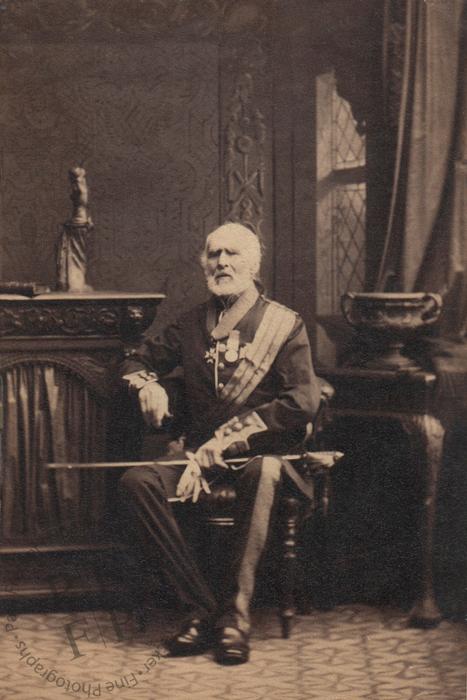General Sir Philip Bainbrigge
(1786-1862)
1 September 1862
Volume 9, page 129, sitting number 11,512.
Born in London on 4 February 1786, Philip Bainbrigge was the eldest son of Lieutenant-Colonel Philip Bainbrigge of Ashbourne in Derbyshire. His mother was Rachel née Dobrée, daughter of Peter Dobrée of Guernsey.
He entered the Army in 1800 when he was fourteen years old, but did not join his regiment in Malta until the following year. He first saw action in the Caribbean in 1807, taking Curaçao from the Dutch, afterwards making plans of the defences and fortifications on the island. The Duke of York advised him to qualify for the staff by studying further at the Royal Military College in High Wycombe. He entered the college in 1809, passed his exams with distinction a year and a half later, and was appointed deputy assistant quartermaster-general in Portugal. He was present at the sieges and storming of Ciudad Rodrigo, Badajoz and Salamanca, examining and making sketches of the country and carrying messages. Soon after the siege of Burgos he was appointed permanent assistant quartermaster-general with the rank of major, a position he held until the end of the war. He was present at the battles of Vittoria and Pyrenees, at the last siege of San Sebastian, and at the battles of Nive and Toulouse. In 1815 he joined the advance on Paris.
On his return home after the peace, he married in Liverpool on 5 April 1816 Sarah Mary Fletcher of Liverpool.
He continued to hold the appointment of permanent assistant quartermaster-general until 1841, when he was made deputy quartermaster-general in Dublin. Having attained the rank of Major-General in 1846, he was appointed by the Duke of Wellington to the command of the Belfast district. In 1852 he took command of the British forces in Ceylon. On his departure in 1854 he was promoted to the rank of Lieutenant-General.
In 1838 he was made a Companion of the Bath, and subsequently received the 'grant for distinguished service.' On 31 March 1854 he was appointed Colonel of the 26th (the Cameronians) Regiment of Foot. For his services in the Peninsula he received the war medal with seven clasps, and on 31 March 1854 he was appointed Knight Commander of the Order of the Bath. According to his entry in the DNB: ‘In his military career he showed the advantage of scientific knowledge, and much of his success in life was owing to his diligent application of this knowledge in the field. His talents and high sense of duty caused him to be greatly valued as an officer, and esteemed by all who knew him’
He died at St Margaret's near Titchfield in Hampshire on 20 December 1862, at the age of 76. He left an estate valued at £6000.

